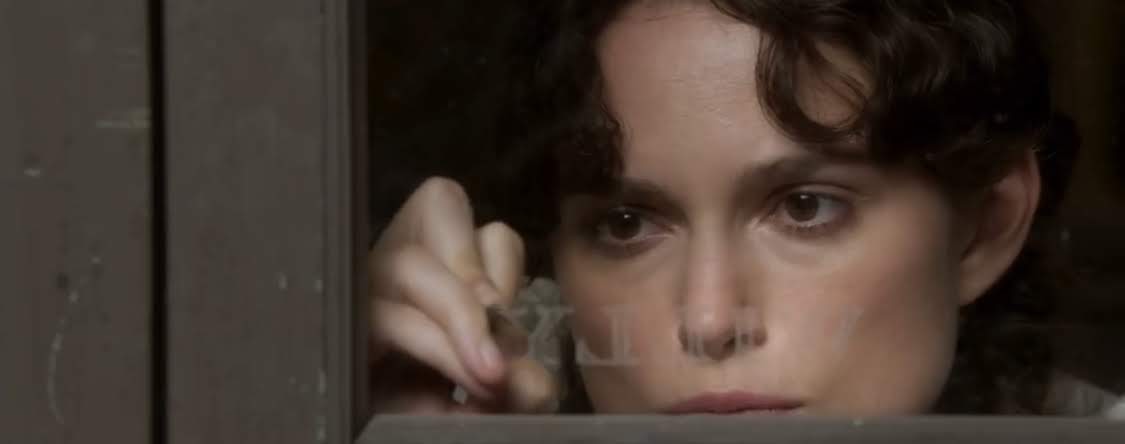
The costume drama, once an ostentatious bid for import in a cash-ready market, has fallen somewhat on hard times, relegating those still intent on exploring it chasing after what little money and distribution remains, often settling for a much less expansive view of a bygone era that was once lavished with blockbuster budgets. Gone are the extravagant balls, the bustling streets, the scrumptious dinner parties. Instead, drawing rooms, small gatherings, a field, a corner on a street – anything to keep costs low. But the imagination is not gone. Persistent art will always demand its place, and with Colette, writer/director Wash Westmoreland has fiercely claimed his place among the smartest and most thoughtful of commercial filmmakers.
Keira Knightley, rarely better cast, carries the mononymous author across nearly twenty years of of her life. She begins the film as Gabrielle, a French country girl of modest means and modest dress, and ends it an iconic bisexual stage star. The journey between those two points is anything but simple, and Westmoreland doesn’t seek to make it easy or to satisfy our liberal notions of sexuality, gender fluidity, or unhappy marriages. Instead, the film acknowledges that people can change in remarkable ways, and even if a romantic match doesn’t endure, that doesn’t mean vital growth can’t happen within it.
That troubled relationship occurs between Colette and Willy, as he is known to his friends, and portrayed exceedingly well by Dominic West. Often cast for his corrupt appearance, he emerges here the very image of congeniality – warm towards Colette’s family, accommodating to their haystack trysts, and eager to take her on the town the moment they’re married; to not only show her off but to show her how to mingle in society’s upper echelons. He enjoys being the man of the hour. Unfortunately, his publishing business isn’t going so great, and he needs material. Enter, his wife. He needn’t even pay her. But like the others under his employ, she shall write and he shall take credit. This is the turn of the century, and even in Paris, a woman has her defined place and duties. But she’s less annoyed by that arrangement, at least at first, than by his other indiscretions, until she too finds a bit of reign to explore her own romantic desires; ones, perhaps, Willy could not fill.
Westmoreland (who cowrote the film with Rebecca Lenkiewicz and his late partner, Richard Glatzer) and editor Lucia Zucchetti have an extraordinary eye for momentum, keeping each of these developments hurtling towards us with the bare minimum of fuss. Willy and Colette no sooner discuss marriage than they’re off to their first party as man and wife; they’ve barely completed the book than it’s already flying off the shelves. They’re afternoon delights – especially for a brief period where they take the same lover – are deftly interwoven with a touch that can only be compared to Lubitsch himself. I’ve seen dozens of films try to pull off that erotic playfulness, only to emerge either out of touch with their own times in an effort to emulate an earlier one, or overly vulgar in an attempt to modernize it. Westmoreland finds the ideal balance, playful and just explicit enough to tease a contemporary audience.
Knightley’s best performances – in Domino, Anna Karenina, Pirates of the Caribbean: Dead Man’s Chest, A Dangerous Method, or Atonement – have to an unusual degree been accompanied by the right costumes. This is not to say she relies on them as such, but she expresses so much in posture that indifferent costuming leaves the range of her ability untapped. That is, to put it lightly, not a problem for Andrea Flesch’s work in Colette. Virtually every wardrobe Knightley has is instantly iconic, and boy can she work them. The saunter she does when first wearing a tuxedo; the ease in a dress brought from her village; the way she gradually grows into the Belle Époque culture through its clothes until she comes to define them.
Knightley also benefits from an active, engaged camera, and while Westmoreland’s set-ups are not as ornate as a Joe Wright or David Cronenberg, nor as experimental as a Tony Scott, he knows how to accomplish in one continuous shot what too many contemporary filmmakers take a half-dozen shots to not accomplish. This allows the actors to develop the pace of the scene, to build a certain camaraderie between them, to let us get carried away on grace and beauty and a little bit of sex. The camera gives Knightley her audience, and she’s as much posturing for Paris or her lovers as she is for it.
I first saw Colette back in January at its premiere at Sundance, and instantly fell in love with it. That affection hasn’t faded one bit since, and revisiting it, it remains one of my favorites of the year.



